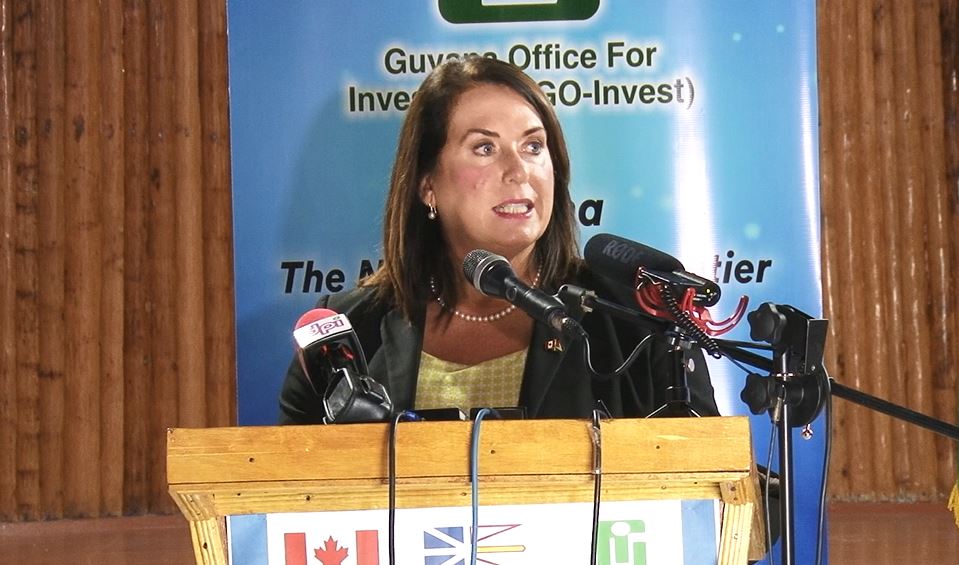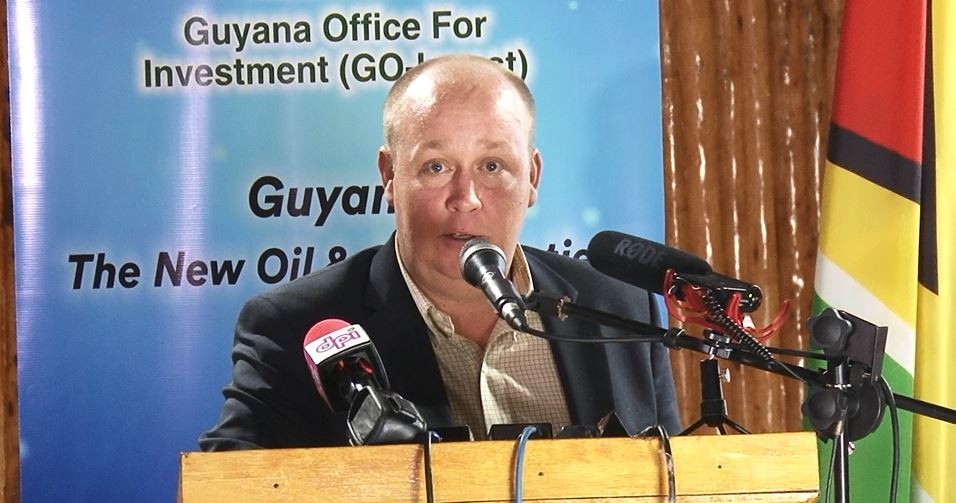
By Bibi Khatoon
There is need for government to monitor the employment practices of companies in the petroleum industry to ensure that they are hiring locals and that they are sourcing local materials to the extent they can, a visiting Canadian minister says.
Minister of Natural Resources of Newfoundland and Labrador in Cananda, Siobhan Coady, was at the time fielding questions from stakeholders during an engagement between a Canadian oil and gas trade mission and local stakeholders at Umana Yana, Kingston on Tuesday night.
Newfoundland and Labrador has signed a Memorandum of Understanding with Guyana for cooperation on oil and gas.
The trade mission is in Guyana for four days to share how it has managed its petroleum industry and to form joint ventures with local companies.
The Canadian Natural Resources Minister noted that “it is very important to ensure local benefits.”
She explained that Canada sought partners around the world and entered joint ventures –something which is encouraged by the Government of Guyana.
This, she said, helped with knowledge transfer and guidance among others.
However, on the governance side, Coady said the Canadian administration sought to ensure that discussions for the development of any production agreement deals with equity, local benefits, royalties and taxation.
“So we sit with developers in the industry and talk about the development of our supply and service chain,” she said in response to questions raised about local content.
Additionally, she pointed to the need for an effective monitoring system.
“On a regular basis, the department of Natural Resources monitors not only the number of employees that any project would have but also any of the supply and service industry, their sub-contractors, we also monitor how they’re utilizing their employment and procurement processes,” the Canadian official said.
A strict monitoring process, she said, is important to ensure everyone is held accountable for their actions and for their contributions to the economy.
The Canadian Minister explained to the News Room that companies are required to report to the Department of Natural Resources about the number of locals involved in their projects and also employed by the major sub-contractors on a monthly basis.
Local benefits and employment impacts are also monitored by a regulator board, she disclosed. The board also monitors all contracts to ensure there is a “full, fair and first opportunity” to the Province.
Job opportunities
Meanwhile, according to figures presented by President of the Newfoundland and Labrador Oil and Gas Industries Association (NOIA), Liam O’Shea, the Province’s oil and gas industry provided 23,500 direct, indirect and induced jobs in that region alone. For the rest of Canada, it produced 10,600 indirect and induced jobs.
NOIA was founded in 1977 and is currently the largest offshore petroleum association in Canada.
O’Shea, during his presentation, noted that while the industry currently provides 23% of the country’s Gross Domestic Product (GDP), at its peak, the industry contributed 36% of GDP.
Wages in the sector is now 6% higher than rest of country’s average, he added.
According to figures presented by NOIA, the oil and gas industry accounts for $1.45B in consumer spending in Newfoundland and Labrador and $561.5M in the rest of Canada.

Newfoundland and Labrador’s Petroleum Industry will provide 56,000 jobs by 2045 and more than double its labour income to $4.6B.
The Canadian province has a basin 45% larger than Norway, according to NOIA.
Questions were also raised about training, tourism diversification and other issues which were addressed.
Earlier in the evening, Head of Guyana’s Energy Department, Dr. Mark Bynoe noted that his department is open to learn from the experiences of other countries.
“What we are seeking is effective dialogue, substantive engagement and evidence based conversations,” Dr. Bynoe said. He added that “we must be humble enough to seek to adopt the best that is contextually relevant to our situation,” since the successful development of the oil and gas sector is vital for the transformation of the Guyanese economy.











